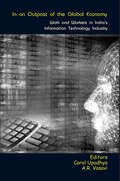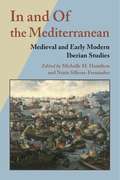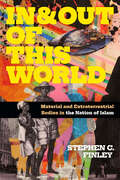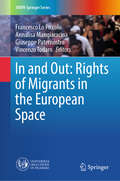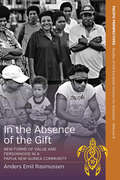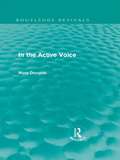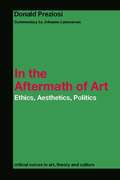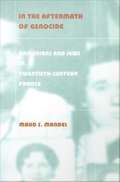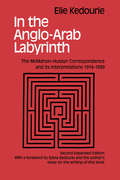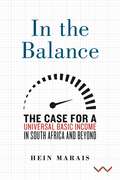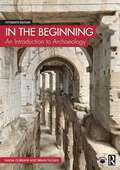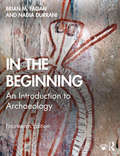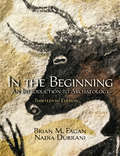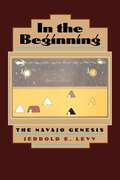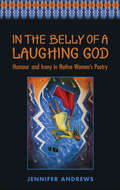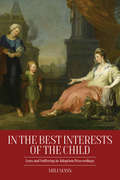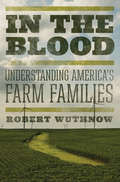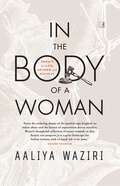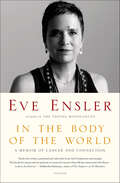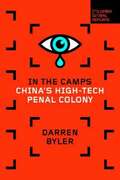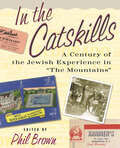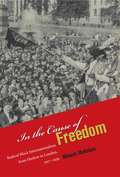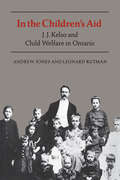- Table View
- List View
In an Outpost of the Global Economy: Work and Workers in India's Information Technology Industry
by Carol Upadhya A. R. VasaviWhile much has been written on the growth of information technology (IT) and IT-enabled services in India, little is known about the people who work in these industries, about the nature of the work itself, and about its wider social and cultural ramifications. The papers in this collection combine empirical research with theoretical insight to fill this gap and explore questions about the trajectory of globalization in India. The themes covered include: (a) sourcing and social structuring of the new global workforce; (b) the work process, work culture, regimes of control and resistance in IT-enabled industries; (c) work, culture and identity; (d) nations, borders and cross-border flows.
In and Of the Mediterranean: Medieval and Early Modern Iberian Studies (Hispanic Issues)
by Michelle M. Hamilton Nuria Silleras-FernandezThe Iberian Peninsula has always been an integral part of the Mediterranean world, from the age of Tartessos and the Phoenicians to our own era and the Union for the Mediterranean. The cutting-edge essays in this volume examine what it means for medieval and early modern Iberia and its people to be considered as part of the Mediterranean.
In and Of the Mediterranean: Medieval and Early Modern Iberian Studies (Hispanic Issues)
by Michelle M. Hamilton and Núria Silleras-FernándezThe Iberian Peninsula has always been an integral part of the Mediterranean world, from the age of Tartessos and the Phoenicians to our own era and the Union for the Mediterranean. The cutting-edge essays in this volume examine what it means for medieval and early modern Iberia and its people to be considered as part of the Mediterranean.
In and Out of This World: Material and Extraterrestrial Bodies in the Nation of Islam (Religious Cultures of African and African Diaspora People)
by Stephen C. FinleyWith In and Out of This World Stephen C. Finley examines the religious practices and discourses that have shaped the Nation of Islam (NOI) in America. Drawing on the speeches and writing of figures such as Elijah Muhammad, Malcolm X, Warith Deen Mohammad, and Louis Farrakhan, Finley shows that the NOI and its leaders used multiple religious symbols, rituals, and mythologies meant to recast the meaning of the cosmos and create new transcendent and immanent black bodies whose meaning cannot be reduced to products of racism. Whether examining how the myth of Yakub helped Elijah Muhammad explain the violence directed at black bodies, how Malcolm X made black bodies in the NOI publicly visible, or the ways Farrakhan’s discourses on his experiences with the Mother Wheel UFO organize his interpretation of black bodies, Finley demonstrates that the NOI intended to retrieve, reclaim, and reform black bodies in a context of antiblack violence.
In and Out: Rights of Migrants in the European Space (UNIPA Springer Series)
by Vincenzo Todaro Francesco Lo Piccolo Annalisa Mangiaracina Giuseppe PaternostroThis book examines contemporary migratory movements, starting from the European zone, but with an extension to other territorial contexts as well, with research orientation that focuses on the account of the migratory experiences collected in the research activity of the different authors, according to a multidisciplinary dimension. Starting from these key topics, the authors articulated and further developed its reflections through its own experiences at the national and international level, taking root within the current scientific debate on migration. The interdisciplinary approach and the different and innovative ways of analysing in depth the thematic contents of the migration phenomenon have made it possible to identify some key research questions. The relative answers find space in the articulated and complex system of contributions that is developed within this book and in particular in the three thematic parts into which it is divided. The first one deals with the theme of migration confronted with issues related to the 'right to the city' and the 'right to housing'; the second one deals with issues related to human rights; finally, the third one focuses on the different narratives of migrants' life experiences and aspects related to the linguistic representation of the urban space.
In the Absence of the Gift: New Forms of Value and Personhood in a Papua New Guinea Community (Pacific Perspectives: Studies of the European Society for Oceanists #5)
by Anders Emil RasmussenBy adopting ideas like “development,” members of a Papua New Guinean community find themselves continuously negotiating what can be expected of a relative or a community member. Nearly half the people born on the remote Mbuke Islands become teachers, businessmen, or bureaucrats in urban centers, while those who stay at home ask migrant relatives “What about me?” This detailed ethnography sheds light on remittance motivations and documents how terms like “community” can be useful in places otherwise permeated by kinship. As the state withdraws, Mbuke people explore what social ends might be reached through involvement with the cash economy.
In the Active Voice (Routledge Revivals)
by Mary DouglasFirst published in 1982, this collection of essays is a reproach to a form of the sociology of religion that treats people as the passive objects of impersonal social influences. In opposition to this, the author seeks to assert an active voice style of thinking about the relations between individuals and their cultural environment, whether in economics, history or literary criticism. This collection is assembled with the guiding principle that all the essays touch upon the borderland between economic values and personal judgements of quality. Several essays illustrate the theme from the place of economics in anthropology and the place of economic behaviour in sociological and cultural criticism. The essay on 'Cultural bias' suggests a systematic method of analysis for investigating social influences on judgement and choice.
In the Aftermath of Art: Ethics, Aesthetics, Politics (Critical Voices in Art, Theory and Culture)
by Johanne Lamoureux Donald PreziosiBy juxtaposing issues and problems, Donald Preziosi's latest collection of essays, In the Aftermath of Art, opens up multiple interpretive possibilities by bringing to the surface hidden resonances in the implications of each text. In re-reading his own writings, Preziosi opens up alternatives to contemporary discourses on art history and visual culture. A critical commentary by critic, historian, and theorist Johanne Lamoureux complements the author's own introduction, mirroring the multiple interpretations within the essays themselves.
In the Aftermath of Genocide: Armenians and Jews in Twentieth-Century France
by Maud S. MandelFrance is the only Western European nation home to substantial numbers of survivors of the World War I and World War II genocides. In the Aftermath of Genocide offers a unique comparison of the country's Armenian and Jewish survivor communities. By demonstrating how--in spite of significant differences between these two populations--striking similarities emerge in the ways each responded to genocide, Maud S. Mandel illuminates the impact of the nation-state on ethnic and religious minorities in twentieth-century Europe and provides a valuable theoretical framework for considering issues of transnational identity. Investigating each community's response to its violent past, Mandel reflects on how shifts in ethnic, religious, and national affiliations were influenced by that group's recent history. The book examines these issues in the context of France's long commitment to a politics of integration and homogenization--a politics geared toward the establishment of equal rights and legal status for all citizens, but not toward the accommodation of cultural diversity. In the Aftermath of Genocide reveals that Armenian and Jewish survivors rarely sought to shed the obvious symbols of their ethnic and religious identities. Mandel shows that following the 1915 genocide and the Holocaust, these communities, if anything, seemed increasingly willing to mobilize in their own self-defense and thereby call attention to their distinctiveness. Most Armenian and Jewish survivors were neither prepared to give up their minority status nor willing to migrate to their national homelands of Armenia and Israel. In the Aftermath of Genocide suggests that the consolidation of the nation-state system in twentieth-century Europe led survivors of genocide to fashion identities for themselves as ethnic minorities despite the dangers implicit in that status.
In the Anglo-Arab Labyrinth: The McMahon-Husayn Correspondence and its Interpretations 1914-1939 (Cambridge Studies In The History And Theory Of Politics Ser.)
by Elie KedouriThe McMahon-Husayn correspondence has been at the heart of Anglo-Arab relations since World War I. It aroused great controversy, particularly over Palestine. Here, it is examined in historical context to determine why it was so obscure and what lay in the minds of those who drafted it.
In the Balance: The Case for a Universal Basic Income in South Africa and Beyond
by Hein MaraisExamines the need and prospects for a UBIAs jobs disappear and wages flat-line, paid work is an increasingly fragile and unattainable basis for dignified life. This predicament, deepened by the COVID-19 pandemic, is sparking urgent debates about alternatives such as a universal basic income (UBI). Highly topical and distinctive in its approach, In the Balance: The Case for a Universal Basic Income in South Africa and Beyond is the most rounded and up-to-date examination yet of the need and prospects for a UBI in a global South setting such as South Africa. Hein Marais casts the debate about a UBI in the wider context of the dispossessing pressures of capitalism and the onrushing turmoil of global warming, pandemics and social upheaval. Marais surveys the meaning, history and appeal of a UBI before even-handedly weighing the case for and against such an intervention. The book explores the vexing questions a UBI raises about the relationship of paid work to social rights, about prevailing notions of entitlement and dependency, and the role of the state in contemporary capitalism. Along with cost estimates for different versions of a basic income in South Africa, it discusses financing options and lays out the social, economic and political implications. This incisive new book advances both our theoretical and practical understanding of the prospects for a UBI.
In the Beginning: An Introduction to Archaeology
by Nadia Durrani Brian FaganIn the Beginning describes the basic methods and theoretical approaches of archaeology. This is a book about fundamental principles written in a clear, engaging style, with minimal use of technical jargon, which approaches archaeology from a global perspective.This new edition includes new case studies and updated sections on the latest archaeological methods, theories, and developments in archaeological science. There are heavily updated chapters on cultural resource management, public archaeology, and the important role of archaeology in society as well as new material on multidisciplinary research, ethics, diversity, underwater archaeology, and the preservation of the archaeological record. Beginning with a broad introduction to the field, this book surveys the highlights of archaeology’s vibrant history, then covers the basics of preservation, dating the past, and the context of archaeological finds. Descriptions of field surveys, including the latest remote-sensing methods, excavation, and artifact analysis, lead into the study of ancient environments, landscapes and settlement patterns, and the people of the past. There is also a chapter on archaeology as a potential career. In the Beginning takes the reader on an evenly balanced journey through today’s archaeology and introduces them to the importance of archaeology in the modern world.This well-illustrated account, with its numerous boxes and sidebars, is laced with interesting and often entertaining examples of archaeological research from around the globe. It is aimed at introductory students in archaeology and anthropology taking survey courses on archaeology, as well as more advanced readers.
In the Beginning: An Introduction to Archaeology
by Brian M. Fagan Nadia DurraniIn the Beginning describes the basic methods and theoretical approaches of archaeology. This is a book about fundamental principles written in a clear, flowing style, with minimal use of technical jargon, which approaches archaeology from a global perspective. Starting with a broad-based introduction to the field, this book surveys the highlights of archaeology’s colorful history, then covers the basics of preservation, dating the past, and the context of archaeological finds. Descriptions of field surveys, including the latest remote-sensing methods, excavation, and artifact analysis lead into the study of ancient environments, landscapes and settlement patterns, and the people of the past. Two chapters cover cultural resource management, public archaeology, and the important role of archaeology in contemporary society. There is also a chapter on archaeology as a potential career. In the Beginning takes the reader on an evenly balanced journey through today’s archaeology. This well-illustrated account, with its numerous boxes and sidebars, is laced with interesting, and sometimes entertaining, examples of archaeological research from all parts of the world. This classic textbook of archaeological method and theory has been in print for nearly 50 years and is used in many countries around the world. It is aimed at introductory students in archaeology and anthropology taking survey courses on archaeology, as well as more advanced readers.
In the Beginning: An Introduction to Archaeology (Myanthrokit Ser.)
by Brian M. Fagan Nadia DurraniDemonstrates the importance of archaeology today In the Beginning: An Introduction to Archaeology presents the history and methods of archaeology and explores its significance today. The text introduces archeology's basic principles along with numerous examples from all over the world. Authors Brian Fagan and Nadia Durrani provide a comprehensive summary of the field for people who have little or no experience. Features: Provides A Comprehensive Overview - Readers gain a broad understanding of archaeology, including its interdisciplinary nature, major scientific contributions, international research, and methods and theories. A special chapter covers career opportunities in archaeology. A new organization moves archaeological theory to the beginning, so readers can develop a deeper understanding of this field. Offers an Engaging Introduction - The jargon-free narrative provides an accessible introduction to the study of archaeology. In the Beginning is now four-color for a livelier and enriching experience. Explores Significant Historical Events - Seven photo essays titled People of the Past appear throughout the book, covering such luminaries as pharaoh Ramses II and societies like the Cro-Magnons of late Ice Age Europe. Spectacular findings featured in Discovery boxes reflect new developments in archaeology. Incorporates Fresh Ideas from a New Co-Author - Esteemed colleague, Nadia Durrani, has been brought on board as a co-author. She brings a wealth of field experience in Arabia, Britain, and elsewhere as well as extensive editorial experience as the former Editor of Current World Archaeology, to the team.
In the Beginning: The Navajo Genesis
by Jerrold E. LevyJerrold E. Levy's masterly analysis of Navajo creation and origin myths shows what other interpretations often overlook: that the Navajo religion is as complete and nuanced an attempt to answer humanity's big questions as the religions brought to North America by Europeans. Looking first at the historical context of the Navajo narratives, Levy points out that Navajo society has never during its known history been either homogeneous or unchanging, and he goes on to identify in the myths persisting traditions that represent differing points of view within the society. The major transformations of the Navajo people, from a northern hunting and gathering society to a farming, then herding, then wage-earning society in the American Southwest, were accompanied by changes not only in social organization but also in religion. Levy sees evidence of internal historical conflicts in the varying versions of the creation myth and their reflection in the origin myths associated with healing rituals. Levy also compares Navajo answers to the perennial questions about the creation of the cosmos and why people are the way they are with the answers provided by Judaism and Christianity. And, without suggesting that they are equivalent, Levy discusses certain parallels between Navajo religious ideas and contemporary scientific cosmology. The possibility that in the future Navajo religion will be as much altered by changing conditions as it has been in the past makes this fascinating account all the more timely.
In the Belly of a Laughing God
by Jennifer AndrewsHow can humour and irony in writing both create and destroy boundaries? In the Belly of a Laughing God examines how eight contemporary Native women poets in Canada and the United States - Joy Harjo, Louise Halfe, Kimberly Blaeser, Marilyn Dumont, Diane Glancy, Jeannette Armstrong, Wendy Rose, and Marie Annharte Baker - employ humour and irony to address the intricacies of race, gender, and nationality. While recognizing that humour and irony are often employed as methods of resistance, this careful analysis also acknowledges the ways that they can be used to assert or restore order.Using the framework of humour and irony, five themes emerge from the words of these poets: religious transformations; generic transformations; history, memory, and the nation; photography and representational visibility; and land and the significance of 'home.' Through the double-voice discourse of irony and the textual surprises of humour, these poets challenge hegemonic renderings of themselves and their cultures, even as they enforce their own cultural norms.
In the Best Interests of the Child: Loss and Suffering in Adoption Proceedings
by Mili MassMarshalling her experience as an expert witness in court proceedings on non-consensual, confidential adoption in Israel, Mass describes legal proceedings following the Israeli state petition that declares children eligible for adoption because of alleged parental incapability, and explores the politics of state intervention in the parent/child relationship. The selected case studies present the testimonies of the children, the parents, the designated adoptive parents, and the state’s representatives, as well as the author’s own testimony.
In the Black Fantastic
by Ekow EshunA richly illustrated exploration of Black culture at its most wildly imaginative, artistically ambitious, and politically urgent.A richly illustrated exploration of Black culture at its most wildly imaginative and artistically ambitious, In the Black Fantastic assembles art and imagery from across the African diaspora. Embracing the mythic and the speculative, it recycles and reconfigures elements of fable, folklore, science fiction, spiritual traditions, ceremonial pageantry, and the legacies of Afrofuturism. In works that span photography, painting, sculpture, cinema, graphic arts, music and architecture, In the Black Fantastic shows how speculative fictions in Black art and culture are boldly reimagining perspectives on race, gender and identity. Standing apart from Western narratives of progress and modernity premised on the historical subjugation of people of color, In the Black Fantastic celebrates the ways that Black artists draw inspiration from African-originated myths, beliefs, and knowledge systems, confounding the Western dichotomy between the real and unreal, the scientific and the supernatural. Featuring more than 300 color illustrations, this beautifully designed book brings together works by leading artists such as Kara Walker, Chris Ofili, and Ellen Gallagher; explores groundbreaking films like Daughters of the Dust and Get Out; considers the radical politics of pan-Africanism and postcolonialism; and much more. Each section—&“Invocation,&” &“Migration,&” and &“Liberation&”—includes an introductory text by Ekow Eshun and longer essays by Eshun, Kameelah L. Martin, and Michelle D. Commander.Artists featured: Larry Achiampong, Jim Adams, Djeneba Aduayom, Leonce Raphael Agbodjelou, John Akomfrah, David Alabo, Edgar Arceneaux, Marc Asekhame, Belkis Ayón, Radcliffe Bailey, Raphaël Barontini, Beddo, Sanford Biggers, Nuotama Bodomo, Nick Cave, Sedrick Chisom, Jacek Chyrosz, Coldefy, Raffaele Contigiani, Damon Davis, Cristina de Middel, Imani Dennison, Jeff Donaldson, Kimathi Donkor, Aaron Douglas, Edouard Duval-Carrié, Curtis Essel, Minnie Evans, Rotimi Fani-Kayode, Ali Fao, Raymond Thomas Farah, Adama Delphine Fawundu, Heinz Fenchel, Ellen Gallagher, Rico Gatson, Maïmouna Guerresi, Prince Gyasi, Lauren Halsey, Allison Janae Hamilton, Thomas Heatherwick, Kiluanji Kia Henda, Kordae Jatafa Henry, David Huffman, Juliana Huxtable, Zas Ieluhee, Alex Jackson, Ayana V. Jackson, Fabiola Jean-Louis, Shintaro Kago, Kéré Architecture, Black Kirby, Victoria Kovios, Wole Lagunju, Wifredo Lam, Jean François Lamoureux, Thomas Leitersdorf, Namsa Leuba, Hew Locke, Michael MacGarry, Gerald Machona, Loïs Mailou Jones, Jean-Louis Marin, Markn, Kerry James Marshall, Moshel Mayer, Mohau Modisakeng, Puleng Mongale, Fabrice Monteiro, Ronald Moody, Kristin-Lee Moolman, Jean-Claude Moschetti, Aïda Muluneh, Wangechi Mutu, Gustavo Nazareno, Rashaad Newsome, Daniel Obasi, Toyin Ojih Odutola, Chris Ofili, Ruby Okoro, Rinaldo Olivieri, Yaoundé Olu, Zohra Opoku, Tasha Orlova, Frida Orupabo, Gordon Parks, Jordan Peele, James Phillips, Naudline Pierre, Keith Piper, Robert Pruitt, Umar Rashid, Robert Reed, Tabita Rezaire, Stacey Robinson, Athi-Patra Ruga, Stanisław Rymaszewski, Alison Saar, Zina Saro-Wiwa, Ignace Sawadogo, Devan Shimoyama, Yinka Shonibare, Mary Sibande, Lorna Simpson, Cauleen Smith, Tavares Strachan, Mickalene Thomas, Bob Thompson, Wilfred Ukpong, David Uzochukwu, Lina Iris Viktor, William Villalongo, Hannsjörg Voth, Kara Walker, Gerald Williams, Kandis Williams, Peter Williams, Saya Woolfalk, Alisha B. Wormsley, Zaha Hadid Architects
In the Blood
by Robert WuthnowFarming is essential to the American economy and our daily lives, yet few of us have much contact with farmers except through the food we eat. Who are America's farmers? Why is farming important to them? How are they coping with dramatic changes to their way of life? In the Blood paints a vivid and moving portrait of America's farm families, shedding new light on their beliefs, values, and complicated relationship with the land.Drawing on more than two hundred in-depth interviews, Robert Wuthnow presents farmers in their own voices as they speak candidly about their family traditions, aspirations for their children, business arrangements, and conflicts with family members. They describe their changing relationships with neighbors, their shifting views about religion, and the subtle ways they defend their personal independence. Wuthnow shares the stories of farmers who operate dairies, raise livestock, and grow our fruit and vegetables. We hear from corn and soybean farmers, wheat-belt farmers, and cotton growers. We gain new insights into how farmers assign meaning to the land, and how they grapple with the increasingly difficult challenges of biotechnology and global markets.In the Blood reveals how, despite profound changes in modern agriculture, farming remains an enduring commitment that runs deeply in the veins of today's farm families.
In the Body of a Woman: Essays on Law, Gender and Society
by Aaliya Waziri&‘From the enduring shame of the marital-rape loophole to online abuse and the horror of superstition-driven murders, Waziri&’s thoughtful collection of essays reminds us that despite our progress, it is a grim landscape for Indian women, with so much left to be done.&’ SHASHI THAROOR &‘The author brilliantly lays bare for the reader the emergent, new societal responses towards sexual attitudes and gender justice and competently captures with nuance and sensitivity the attempts of the legal system to keep pace without being overwhelmed.&’ SALMAN KHURSHID &‘An incisive and mindful analysis of gender and parity through the intersection of legal frameworks and societal perspectives. Aaliya Waziri draws upon a vast canvas to present an articulate and thoughtful case for gender-responsive lawmaking.&’ NAMITA GOKHALE From important contemporary issues like the changing landscape of marital rape laws to the inadequacy of the current cyberbullying laws, from historical milestones such as the women who helped draft the Indian constitution after Independence to examining religious laws and international obligations, Aaliya Waziri writes a deeply researched, informative and powerful book. Her attempt is to address the many questions that a lay person or even a lawyer might have about what lies at the intersection of law, gender and society.In the Body of a Woman, with its focus on gender justice, pivots on the idea that feminism is contextual. There may not be any straightjacket formula to fix all the woes of women but we can start by strengthening our institutional responses and not treat half the country&’s population as second class citizens. Occasionally acerbic yet deeply compassionate, hopeful yet sometimes despairing, Waziri doesn&’t pull her punches in these essays where she looks clinically at the judicial system but in her own unique, empathetic way that makes this book an engaging read for—it must be stressed—men and women who are interested in probing the intersection of law and gender.
In the Body of the World: A Memoir of Cancer and Connection
by Eve EnslerThe bestselling author of The Vagina Monologues shares her “extraordinarily riveting, graphic story of survival” (Publishers Weekly).In this extraordinary and evocative memoir, playwright, author, and activist V, formerly Eve Ensler, traces many paths of reconnection: with her body, after she is diagnosed with cancer; with the people of the world, in the face of injustice and abuse; and with the earth, victim of mass exploitation.Working in the Congo, V meets survivors of horrific rape and violence and sees firsthand how these women are creating hope and possibility out of horror. Just as she is about to help open a revolutionary leadership center called City of Joy, she is diagnosed with uterine cancer, resulting in months of difficult treatment. Through her experience, V is forced to become first and foremost a body—pricked, punctured, cut, scanned. As she recovers from her illness, V is able to let go of everything that doesn’t matter and find strength in what does.In the Body of the World is a haunting, revelatory work that calls on us to reestablish our connection to our bodies, to the world, and to those around us.Praise for In the Body of the World“Warm, funny, furious, and astute, as well as poetic, passionate, and heroic, Ensler harnesses all that she lost and learned to articulate a galvanizing vision of the essence of life: ‘The only salvation is kindness.’ . . . [A] scorching and enlightening memoir.” —Booklist (starred review)“A necessary book to read for its fierce, passionate commitment to making the world a safe place for women.” —The Boston Globe
In the Camps: China's High-Tech Penal Colony
by Darren BylerHow China used a network of surveillance to intern over a million people and produce a system of control previously unknown in human history. <p><p> Novel forms of state violence and colonization have been unfolding for years in China's vast northwestern region, where more than a million and a half Uyghurs and others have vanished into internment camps and associated factories. <p><p>Based on hours of interviews with camp survivors and workers, thousands of government documents, and over a decade of research, Darren Byler, one of the leading experts on Uyghur society and Chinese surveillance systems, uncovers how a vast network of technology provided by private companies—facial surveillance, voice recognition, smartphone data—enabled the state and corporations to blacklist millions of Uyghurs because of their religious and cultural practice starting in 2017. Charged with "pre-crimes" that sometimes consist only of installing social media apps, detainees were put in camps to "study"—forced to praise the Chinese government, renounce Islam, disavow families, and labor in factories. <p><p>Byler travels back to Xinjiang to reveal how the convenience of smartphones have doomed the Uyghurs to catastrophe, and makes the case that the technology is being used all over the world, sold by tech companies from Beijing to Seattle producing new forms of unfreedom for vulnerable people around the world.
In the Catskills: A Century of Jewish Experience in "The Mountains"
by Ed. Brown PhilThrough fiction, memoir, music, photography, and art, In the Catskills highlights the Catskills experience over a century and assesses its continuing impact on American music, comedy, food, culture, and religion. It features selections from such fiction writers as Isaac Bashevis Singer, Herman Wouk, Allegra Goodman and Vivian Gornick; and original contributions from historians, sociologists, and scholars of American and Jewish culture that trace the history of the region, the rise of hotels and bungalow colonies, the wonderful flavors of food and entertainment, and distinctive forms of Jewish religion found in the Mountains.What was life--the work, the play, the food, the romance--like at Catskills Mountains resorts? These very personal recollections capture the special sense of community and real sense of freedom that developed. Far from the welter of the city, Jewish families learned to vacation and enjoy themselves, to savor the social mobility and cultural space the resorts afforded, and to nourish their culinary and comic traditions. From "Bingo by the Bungalow" by Thane Rosenbaum to "Young Workers in the Hotels" by Phil Brown to "Shoot the Shtrudel to Me Yudel" by Henry Foner, this charming anthology captures an era that has had enormous impact on the Jewish experience and American culture as a whole."Whenever I speak about the Catskills," observes editor Phil Brown, "I am struck by the strength of people's desire to relive their experiences in the Mountains." If you've visited the Catskills yourself, or heard stories from your parents or grandparents, or are just interested in this extraordinary time and place, pack your bags and prepare to enjoy your stay In the Catskills.
In the Cause of Freedom
by Minkah MakalaniIn this intellectual history, Minkah Makalani reveals how early-twentieth-century black radicals organized an international movement centered on ending racial oppression, colonialism, class exploitation, and global white supremacy. Focused primarily on two organizations, the Harlem-based African Blood Brotherhood, whose members became the first black Communists in the United States, and the International African Service Bureau, the major black anticolonial group in 1930s London, In the Cause of Freedom examines the ideas, initiatives, and networks of interwar black radicals, as well as how they communicated across continents.Through a detailed analysis of black radical periodicals and extensive research in U.S., English, Dutch, and Soviet archives, Makalani explores how black radicals thought about race; understood the ties between African diasporic, Asian, and international workers' struggles; theorized the connections between colonialism and racial oppression; and confronted the limitations of international leftist organizations. Considering black radicals of Harlem and London together for the first time, In the Cause of Freedom reorients the story of blacks and Communism from questions of autonomy and the Kremlin's reach to show the emergence of radical black internationalism separate from, and independent of, the white Left.
In the Children's Aid: J.J. Kelso and Child Welfare in Ontario
by Leonard Rutman Andrew JonesThe present system of child welfare in Canada dates from 1893, the year in which the Ontario Legislature passed 'An Act for the Prevention of Cruelty to, and better Protection of, Children.' The Act provided for the establishment of Children's Aid Societies with extensive legal powers to intervene in cases of child neglect and cruelty, and gave officials sanction to the foster care system. These radical departures from earlier policy resulted from the actions of John Joseph Kelso, the man who was named as the first Superintendent of Neglected and Dependent Children – a position created by the same Act. At 29, Kelso was already one of Ontario's leading proponents of child welfare reform. He had earlier stimulated the formation of the Toronto Humane Society and subsequently guides its early growth. In 1888 he had formed the Children's Fresh Air Fund and the Santa Claus Fund, out of which, in 1891, he founded the Toronto Children's Aid Society. From 1893 to his retirement in 1934, Kelso directed and promoted the establishment and development of Children's Aid Societies in Ontario and played an important role in their spread to other provinces. In 1921 he was appointed administrator of Ontario's first Adoption Act and the Children of Unmarried Parents Act. His reform activities extended into the children's court movement, the closing of reformatories, organization of playgrounds, and advocacy of mothers' allowances. This biography provides an account of Kelso's life and career as a social reformer, and reveals him as the undisputed chief architect and builder of Ontario's welfare system. It will interest the academic and professionals as it traces the roots of social welfare services and the profession of social work, and the general reader interested in Canadian history and social reform.
